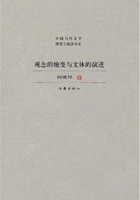With this hysterically over-simplified view of life, fostered by lack of self-knowledge, was connected a corresponding mistake as to the means by which his ends could be reached. One of the first observations which generous spirits often make is that the unsatisfactory state of society is due to some very small kink or flaw in the dispositions of the majority of people. This perception, which it does not need much experience to reach, is the source of the common error of youth that everything can be put right by some simple remedy. If only some tiny change could be made in men's attitude towards one another and towards the universe, what a flood of evil could be dammed; the slightness of the cause is as striking as the immensity of the effect. Those who ridicule the young do not, perhaps, always see that this is perfectly true, though of course they are right in denouncing the inference so often drawn--and here lay Shelley's fundamental fallacy--that the required tiny change depends on an effort of the will, and that the will only does not make the effort because feeling is perverted and intelligence dimmed by convention traditions, prejudices, and superstitions. It is certain, for one thing, that will only plays a small part in our nature, and that by themselves acts of will cannot make the world perfect. Most men are helped to this lesson by observation of themselves; they see that their high resolves are ineffective because their characters are mixed. Shelley never learnt this. He saw, indeed, that his efforts were futile even mischievous; but, being certain, and rightly, of the nobility of his aims, he could never see that he had acted wrongly, that he ought to have calculated the results of his actions more reasonably. Everthwarted, and never nearer the happiness he desired for himself and others, he did not, like ordinary men attain a juster notion of the relation between good and ill in himself and in the world; he lapsed into a plaintive bewildered melancholy, translating the inexplicable conflict of right and wrong into the transcendental view that"Life, like a dome of many-coloured glass, Stains the white radiance of Eternity."But his failure is the world's gain, for all that is best in his poetry is this expression of frustrated hope. He has indeed, when he is moved simply by public passion, some wonderful trumpet-notes; what hate and indignation can do, he sometimes does. And his rapturous dreams of freedom can stir the intellect, if not the blood. But it must be remarked that poetry inspired solely by revolutionary enthusiasm is liable to one fatal weakness: it degenerates too easily into rhetoric. To avoid being a didactic treatise it has to deal in high-flown abstractions, and in Shelley fear, famine, tyranny, and the rest, sometimes have all the emptiness of the classical manner. They appear now as brothers, now as parents, now as sisters of one another; the task of unravelling their genealogy would be as difficult as it is pointless. If Shelley had been merely the singer of revolution, the intensity and sincerity of his feeling would still have made him a better poet than Byron; but he would not have been a great poet, partly because of the inherent drawbacks of the subject, partly because of his strained and false view of "the moral universe" and of himself. His song, in treating of men as citizens, as governors and governed, could never have touched such a height as Burns' "A man's a man for a' that."Fortunately for our literature, Shelley did more than arraign tyrants. The Romantic Movement was not merely a new way of considering human beings in their public capacity; it meant also a new kind of sensitiveness to their environment. If we turn, say, from Pope's 'The Rape of the Lock' to Wordsworth's 'The Prelude', it is as if we have passed from a saloon crowded with a bewigged and painted company, wittily conversing in an atmosphere that has become rather stuffy, into the freshness of a starlit night. And just as, on stepping into the open air, the splendours of mountain, sky, and sea may enlarge our feelings withwonder and delight, so a corresponding change may occur in our emotions towards one another; in this setting of a universe with which we feel ourselves now rapturously, now calmly, united, we love with less artifice, with greater impetuosity and self-abandonment. "Thomson and Cowper," says Peacock, "looked at the trees and hills which so many ingenious gentlemen had rhymed about so long without looking at them, and the effect of the operation on poetry was like the discovery of a new world." The Romantic poets tended to be absorbed in their trees and hills, but when they also looked in the same spirit on their own hearts, that operation added yet another world to poetry. In Shelley the absorption of the self in nature is carried to its furthest point. If the passion to which nature moved him is less deeply meditated than in Wordsworth and Coleridge, its exuberance is wilder; and in his best lyrics it is inseparably mingled with the passion which puts him among the world's two or three greatest writers of love-poems.
Of all his verse, it is these songs about nature and love that every one knows and likes best. And, in fact, many of them seem to satisfy what is perhaps the ultimate test of true poetry: they sometimes have the power, which makes poetry akin to music, of suggesting by means of words something which cannot possibly be expressed in words. Obviously the test is impossible to use with any objective certainty, but, for a reason which will appear, it seems capable of a fairly straightforward application to Shelley's work.
First we may observe that, just as the sight of some real scene-- not necessarily a sunset or a glacier, but a ploughed field or a street-corner-- may call up emotions which "lie too deep for tears" and cannot be put into words, this same effect can be produced by unstudied descriptions. Wordsworth often produces it:















